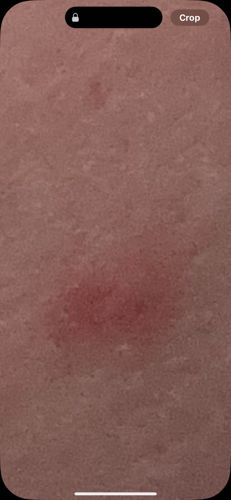Mosquito bite
Scientific Name: N/A (This is a reaction to an insect, not an insect itself)
Order & Family: N/A (The insect is likely from Order Diptera, Family Culicidae if it is a mosquito)
Size: N/A (A mosquito reaction is typically a raised bump, often 0.5 to 2 cm in diameter. Adult mosquitoes typically range from 3 to 6 mm in length.)

Natural Habitat
N/A (Mosquitoes are found worldwide in various freshwater habitats for larvae, and adults are found in humid environments, often near humans and animals)
Diet & Feeding
N/A (Female mosquitoes feed on blood, which provides proteins necessary for egg development. Male mosquitoes feed on nectar and plant juices.)
Behavior Patterns
N/A (Mosquitoes are most active during dawn and dusk, though some species are active during the day. They locate hosts primarily through detecting CO2, body heat, and certain chemicals.)
Risks & Benefits
Potential risks include itching, swelling, and redness from the bite itself. More significantly, mosquitoes are vectors for numerous diseases such as malaria, dengue fever, Zika virus, West Nile virus, and chikungunya. There are no direct benefits to humans from mosquito bites. In ecosystems, mosquitoes serve as a food source for other animals (e.g., birds, bats, fish) and adult males can act as pollinators.
Identified on: 9/7/2025